Still wondering if generative AI is worth the hype?
What if your team could automatically write hundreds of personalized emails in just a few clicks? Or generate complex business reports in minutes instead of hours? What if you could summarize a 100-page legal document or product manual in seconds — without reading a single line?
That’s exactly what the top generative AI tools are helping enterprises achieve in 2025. These tools aren’t just about saving time — they’re built for scalability, accuracy, security, and real-world use cases across departments like marketing, HR, legal, finance, and customer support. Whether you’re looking to boost productivity, cut operational costs, or enhance decision-making, generative AI is becoming a strategic asset — not just a tech trend.
In this blog, we’ll explore the best Generative AI Tools for Enterprise making a real impact this year — and how your business can benefit from them.
Why Are Businesses Adopting Generative AI in 2025?
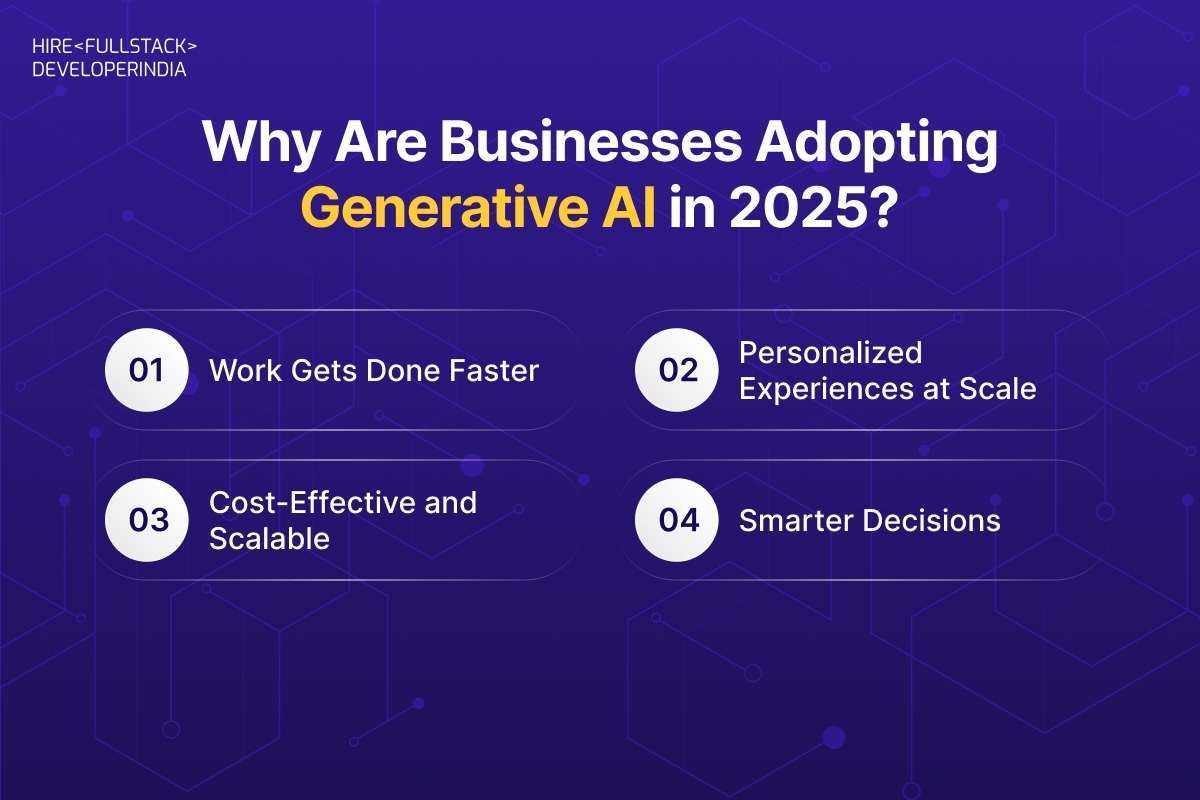
You might wonder, “Why is all this buzz around generative AI?” The answer is simple — it saves time, reduces costs, and helps teams do more with less.
Here are a few reasons why more companies are jumping on the GenAI bandwagon:
- Work Gets Done Faster
From writing emails to generating reports or designing a marketing plan — AI tools can do it in minutes. This frees up your team’s time to focus on strategy and creativity. - Personalized Experiences at Scale
AI can help create tailored messages for your customers based on their behavior, preferences, or buying history. Imagine writing 1,000 personalized emails in just a few clicks! - Cost-Effective and Scalable
Instead of hiring large teams or spending days on manual tasks, businesses can use AI tools to automate repetitive work. It helps save both time and money. - Smarter Decisions
AI can summarize large reports, analyze data, and even suggest improvements. It’s like having an assistant who reads everything and gives you the highlights instantly.
What to Look for in Enterprise AI Tools 2025
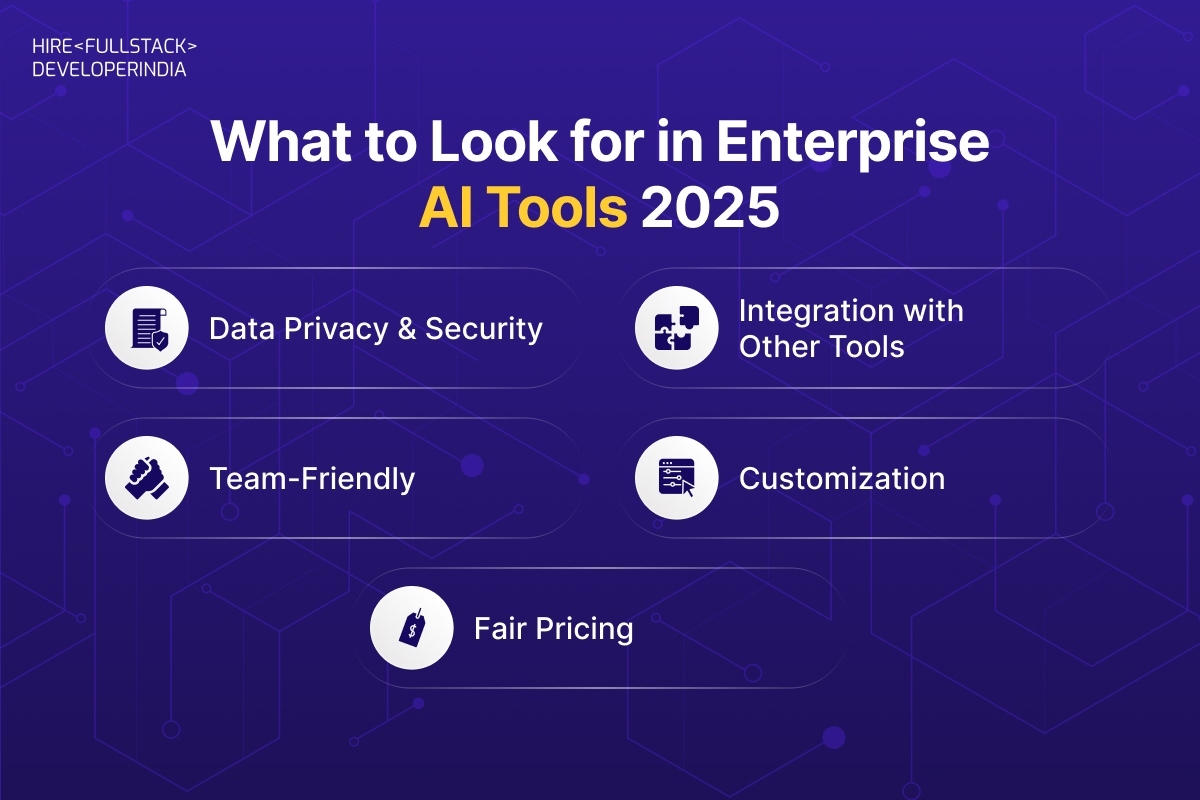
Whether you’re evaluating AI solutions for business 2025 or planning long-term tech investments, here are the features that matter most. Not every AI tool is built for business use. Here are a few must-have features that make an AI tool truly enterprise-ready:
Data Privacy & Security
Your business deals with sensitive data. Make sure the AI tool follows strict security standards like GDPR or HIPAA. Tools that don’t store or train on your data are a safer bet.
Integration with Other Tools
Good AI tools should easily connect with your existing systems — like your CRM, email platform, or internal apps.
Team-Friendly
If your whole team is using the tool, it should support multiple users, access controls, and collaboration features.
Customization
Every business is different. A great enterprise AI tool should let you train or tweak it based on your own data and processes.
Fair Pricing
You don’t want to pay for features you won’t use. Look for tools that offer flexible plans or pay-as-you-go models.
Top Generative AI Tools for Enterprises in 2025
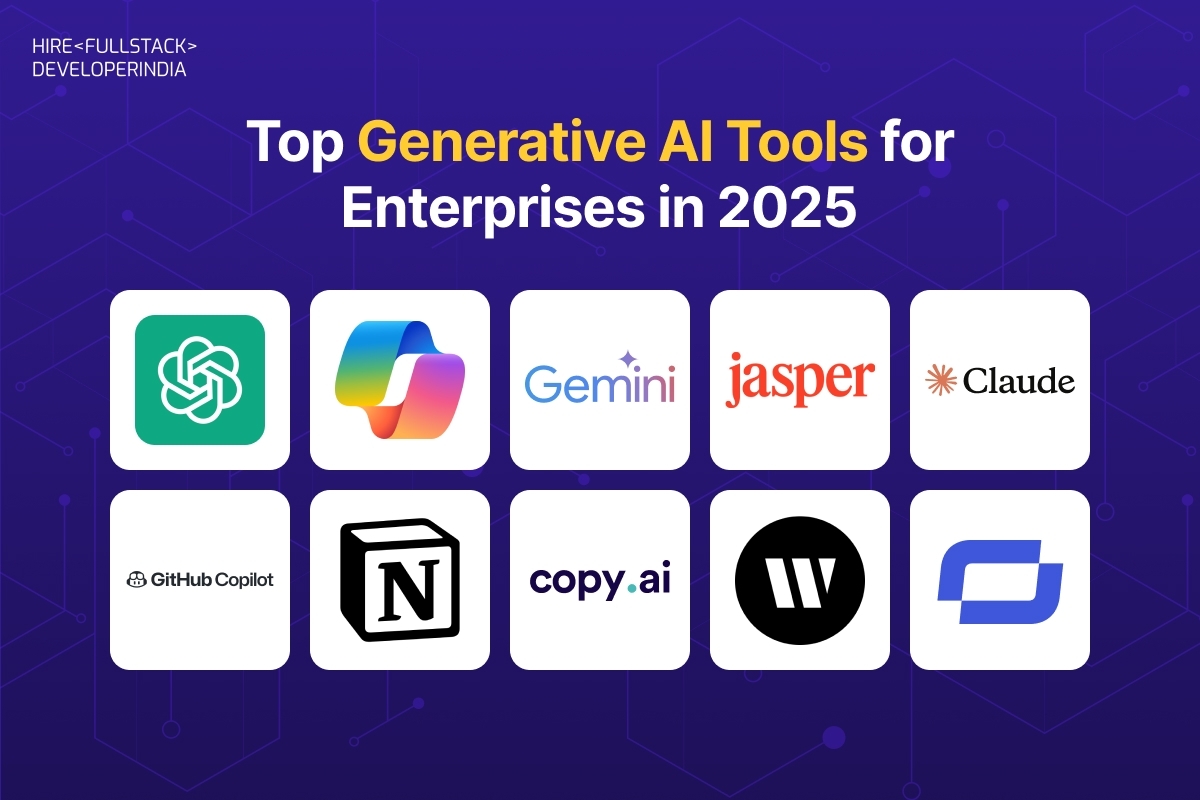
Here are some of the top-performing Generative AI Tools for Enterprise teams — carefully selected for their business impact, security, and scalability in 2025. As more industries adopt AI solutions for business 2025, these tools are leading the charge in innovation, automation, and ROI.
1. ChatGPT Enterprise by OpenAI
Best for: Productivity, internal automation, customer service
ChatGPT Enterprise is the robust business version of OpenAI’s popular AI assistant. It’s built for teams and comes with advanced features like unlimited GPT-4 access, 32k context windows (so it remembers longer chats), data encryption, admin tools, and full compliance with enterprise-level security.
Whether your team needs to draft emails, write proposals, summarize meeting transcripts, brainstorm ideas, or generate code — ChatGPT Enterprise does it all. Plus, with no data retention, your company data is safe. It's great for HR, customer service, product, legal, and content teams.
Why it stands out:
- No usage limits
- Advanced data analytics (great for reports or spreadsheets)
- Admin dashboard for team control
- Integrates with your internal systems
2. Microsoft Copilot (365 + Azure)
Best for: Office work, document creation, business insights
Microsoft Copilot is like having an intelligent assistant embedded across all Microsoft apps. In Word, it can draft reports. In Excel, it analyzes data trends. In Outlook, it helps you write and prioritize emails. And in Teams, it can recap meetings and suggest follow-up actions.
It’s especially valuable for enterprise teams that already work within the Microsoft ecosystem — no new software learning required. It simply enhances the tools your employees already use every day.
Why it stands out:
- Built into tools you already use
- Smart data analysis in Excel
- Meeting notes and summaries in Teams
- Azure OpenAI support for private deployment
3. Google Duet AI (Now Google Gemini for Workspace)
Best for: Google Workspace users (Docs, Sheets, Gmail, etc.)
Google’s Duet AI, now part of Google Gemini, is Google’s response to Copilot. It empowers Gmail, Docs, and Sheets with smart suggestions, content writing, formula generation, and even project planning.
Imagine writing a project proposal in Docs, and the AI fills in key sections, adds structure, and suggests edits — all in real time. In Gmail, it can auto-write replies, or generate email campaigns with a friendly tone. Gemini also works across Android and Google Cloud for even broader enterprise integration.
Why it stands out:
- Makes writing and organizing faster inside Google Workspace.
- Helps with creative brainstorming, content editing, and email handling.
- Smart, context-aware suggestions and automation.
- Ideal for teams already on Google Workspace.
4. Jasper AI (Business Version)
Best for: Marketing teams, content creation
Jasper AI is a powerful generative AI platform built for enterprise marketing. It can write blog posts, social media copy, email campaigns, product descriptions, and even video scripts — all while maintaining a consistent brand tone and voice.
Jasper’s standout feature is “Brand Voice,” which allows businesses to train the AI to write like them. Large marketing teams love it because it supports collaboration, approval workflows, and multiple content types — making it much more than a copy tool.
Why it stands out:
- Custom brand voice settings
- Built-in templates for different content types
- Collaboration tools for teams
- Works well with CMS and CRM platforms
5. Claude for Enterprise by Anthropic
Best for: Enterprise use cases needing high accuracy, ethics, and long context memory.
Claude is designed with a focus on AI safety, explainability, and reliability. It can handle extremely long documents (like legal contracts, reports, research papers) — up to 100,000+ tokens — and still summarize or analyze them effectively.
Anthropic has built Claude to be a more “thoughtful” AI, with better understanding of intent, fewer hallucinations, and more ethical responses. That makes it ideal for industries like legal, finance, healthcare, or education, where accuracy and safety matter most.
Why it stands out:
- Can process very long documents in one go.
- More aligned responses with reduced bias or hallucination.
- Trusted by enterprises looking for transparency and control.
- Great for legal analysis, compliance, and documentation.
6. GitHub Copilot for Business
Best For: Software development teams.
Built in partnership with OpenAI, GitHub Copilot is a code generation assistant that helps developers write code faster, suggest improvements, and auto-complete functions in real time — directly inside VS Code and other IDEs.
For large engineering teams, it means fewer repetitive tasks, faster prototyping, and higher code quality. GitHub Copilot for Business adds privacy controls, admin features, and policy management so enterprises can scale its use securely.
Why it’s great for businesses:
- Saves time on writing boilerplate code.
- Helps new developers onboard faster.
- Improves code quality and reduces bugs.
- Maintains IP privacy for businesses.
7. Notion AI
Best For: Project documentation, note-taking, and internal knowledge management.
If your business runs on documentation — SOPs, wikis, meeting notes, or product guides — Notion AI is a game-changer. It enhances Notion’s productivity platform with AI-powered suggestions, summaries, task creation, and translation.
You can simply ask it to “summarize meeting notes,” “generate an onboarding checklist,” or “improve writing tone,” and it does the rest. For startups and creative teams, it’s a perfect blend of simplicity and power.
Why it’s great for businesses:
- Turns messy notes into clean documents.
- Automatically creates tasks and summaries from text.
- Enhances team productivity without needing new tools.
- Great for internal documentation and cross-functional collaboration.
8. Copy.ai (Workflows)
Best For: Marketing, outreach, and sales automation.
Copy.ai started as a writing assistant, but its 2025 version is now a full-blown AI workflow automation platform. You can build custom workflows that generate hundreds of personalized cold emails, LinkedIn messages, follow-ups, or sales pages — all tailored to your target audience.
This is especially useful for sales and marketing teams who need to scale outreach without sounding robotic. The “Workflows” feature is what makes it powerful — it combines prompts, inputs, and logic into reusable automations.
Why it’s great for businesses:
- Saves time on outreach and lead generation.
- Produces high-conversion copy that’s tailored to each user.
- Helps small teams scale like a big one.
- Easy to set up, no dev skills required.
9. Writer AI (Enterprise-Grade LLM Platform)
Best For: Enterprise content governance and compliance.
Writer is designed for regulated industries like finance, healthcare, and legal where content accuracy, compliance, and consistency are non-negotiable. It uses a company’s own style guides, policies, and knowledge base to generate content.
It also has strong guardrails — meaning it won’t produce off-brand, inaccurate, or non-compliant content. This makes it a favorite for documentation teams, internal communications, and legal
departments.
Why it’s great for businesses:
- Keeps enterprise content consistent and compliant.
- Built-in governance and approval workflows.
- Can be integrated into CRMs, CMS, and helpdesk tools.
- Designed for scale and security.
10. Synthesia
Best For: Creating AI-generated videos for training, marketing, or internal communication.
Synthesia lets businesses turn text into high-quality videos using AI avatars and voiceovers — in multiple languages. It’s widely used by HR, L&D, and marketing teams to create training modules, product explainers, onboarding videos, and internal updates without hiring a video team.
You can select a digital avatar, choose a voice and language, paste your script, and generate a full video in minutes. No camera, studio, or actors needed.
Why it’s great for businesses:
- Saves money on video production.
- Scales training and onboarding across geographies.
- Supports 120+ languages and accents.
- Perfect for remote and hybrid teams.
Where These Tools Shine: Industry Use Cases
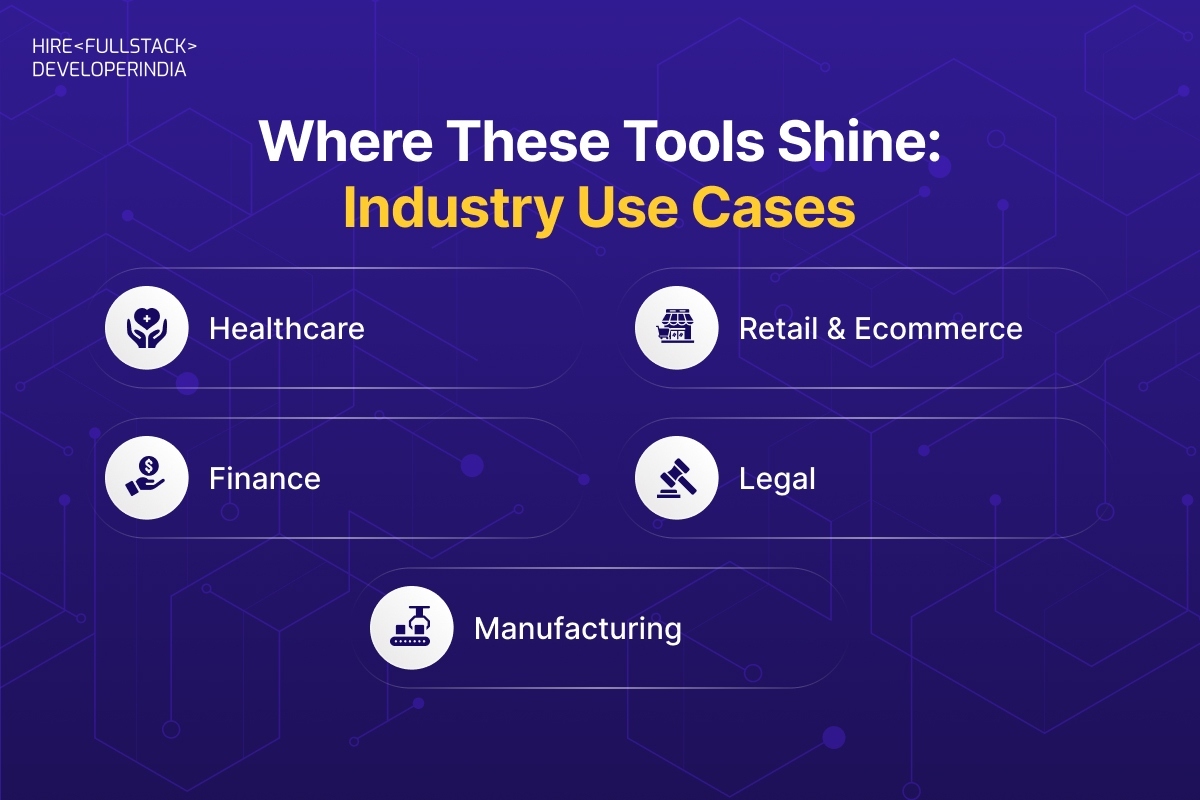
Generative AI is being used in almost every industry today. Here's how businesses are using it in the real world:
Healthcare
- Generating medical summaries
- Scheduling and answering patient queries
- Translating reports into simple language
Retail & Ecommerce
- Writing product descriptions
- Personalizing offers or recommendations
- Automating customer chat support
Finance
- Summarizing financial reports
- Fraud detection insights
- Auto-generating tax documents
Legal
- Drafting contracts and legal memos
- Reviewing long documents faster
- AI-based legal research
Manufacturing
- Writing SOPs and technical manuals
- Predicting maintenance needs
- Creating supplier emails and updates
Challenges to Be Aware Of Enterprise AI Tools 2025
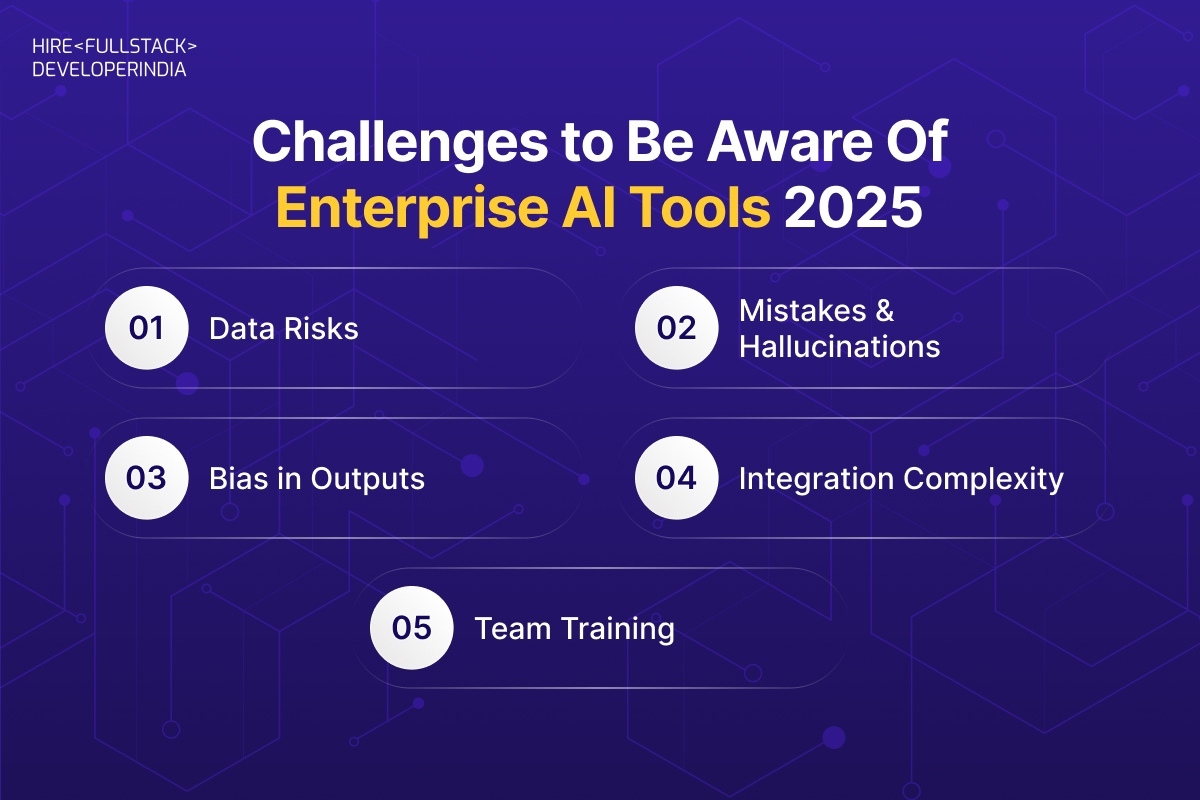
While generative AI is powerful, there are a few things to watch out for:
- Data Risks
Be sure that the tools you use don’t store or misuse your customer or internal data. Always check the fine print. - Mistakes & Hallucinations
AI can sometimes make up facts or give wrong answers. Always have a human review before sending anything important. - Bias in Outputs
AI tools can reflect bias from their training data. It’s important to monitor for fairness, especially in hiring or legal decisions. - Integration Complexity
Older systems might not work well with new AI tools. You may need IT support to connect everything properly. - Team Training
Not everyone on your team will be familiar with AI tools. Some training and change management may be needed.
What’s Next for Enterprise AI?
Looking beyond 2025, here are a few trends to watch:
- AI agents that complete full tasks on their own (like booking meetings, handling orders, or writing entire reports)
- Industry-specific AI models trained just for your niche
- Multi-agent systems — think of AI bots working together like a human team
- Tighter AI regulations and ethical standards
- AI on your own device or server (no cloud dependency)
Conclusion
Generative AI tools for enterprise use aren’t just a trend — they’re now essential AI solutions for business 2025 and beyond. Whether you're creating content, automating workflows, or making decisions faster, there’s a GenAI solution built for your enterprise.
By choosing the right tool based on your industry, needs, and security preferences, you can bring real value to your organization in 2025 and beyond.


